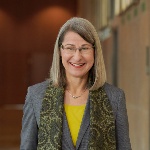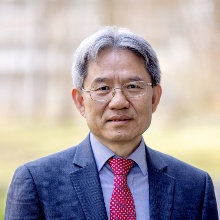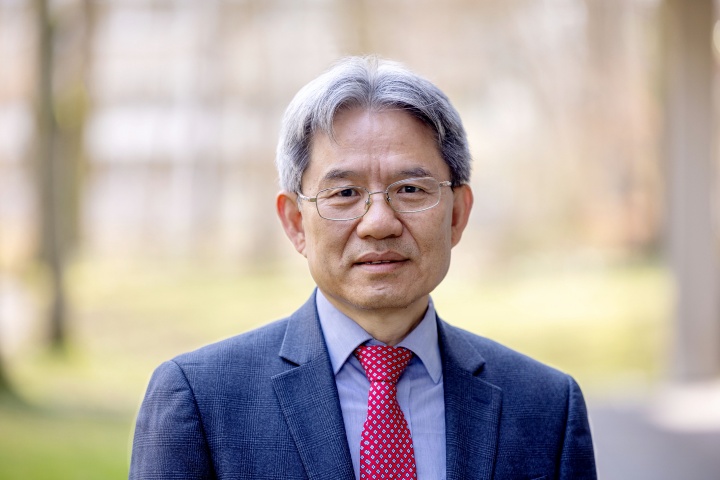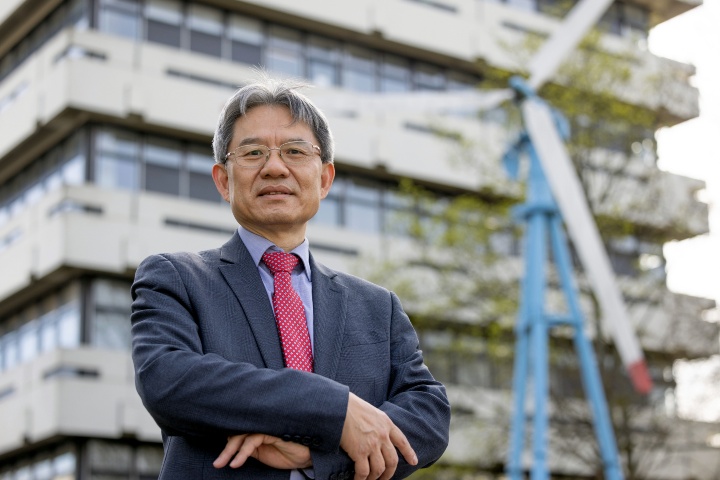He develops new high-performance energy storage systems for solar and wind power: Prof. Yulong Ding from the University of Birmingham is visiting the University of Stuttgart and the DLR Institute of Engineering Thermodynamics as the winner of the Alexander von Humboldt Research Award. As a member of Prof. André Thess' team, he aims to advance the technical foundations for the future energy supply transformation.
"One of my goals here in Stuttgart is to improve the efficiency and cost-effectiveness of Carnot batteries," says Ding. Carnot batteries convert surplus electricity from low carbon sources, e.g. renewables, into thermal energy, which can be stored in large scale and converted back into electricity when needed. This addresses the fluctuation and variation nature of wind and solar power generation. Ding is regarded as one of the foremost research figures in this field globally. In Stuttgart, he will be focusing specifically on liquid air energy storage (LAES) - a technology that he invented and led the initial stage of technology development.
Three times thermal energy
LAES is a special form of Carnot battery because it functions without high-temperature heat pumps. "It works by turning excess electricity into liquid air to be stored in a cryogenic tank," explains Ding. For efficiency, apart from the liquid air store (-190 degrees Celsius), high-quality cold (-160 degrees Celsius) and compression heat (~300 degrees Celsius) are also stored, giving a total of three coupled thermal stores. Yulong Ding is deeply involved in developing new methods to enhance the compression heat utilization. To this end, he is actively researching and optimizing cascading processes to make LAES technology more efficient and cost-effective.
Industry without fossil fuels
Secondly, Ding is investigating how the LAES can be integrated into foundation industrial processes through sector coupling. This means that Carnot batteries will not only offer the function of storing surplus solar or wind power, but the stored thermal energy can also be made directly available to industrial processes. These processes require a great deal of heat, which until now has come from fossil sources, e.g. coal and natural gas. "If we replace fossil heat with renewable heat, we can decarbonize the production of steel, cement, glass, ceramics or chemicals," explains Yulong Ding. In Stuttgart, his work will focus specifically on the steel sector, which produces large quantities of greenhouse gases. The aim is to integrate Carnot batteries with ironmaking process – the most energy and carbon intensive part of steel sector.
Waste heat from green hydrogen
Thirdly, Yulong Ding wants to explore what the next generation of energy infrastructure could look like. He envisages a network of highly efficient, cost-effective, multi-sectoral energy services that utilizes as many thermal energy sources as possible. In Stuttgart, Ding wants to investigate the supply chain and find ways to use the waste heat generated during the production, compression, storage and use of hydrogen efficiently and cost-effectively.
Host Professor André Thess is thrilled about the visitor from Birmingham. "By awarding the Alexander von Humboldt Prize to my esteemed colleague Professor Yulong Ding, the foundation is recognizing his excellence in both basic research and industrial collaborations," states Thess. Furthermore, this award signifies the immense importance of affordable, safe, and environmentally friendly thermal energy storage for buildings, industrial processes, and low-CO2 power plants. In collaboration with his guest, Prof. Thess aims not only to research new concepts for storing electrical energy in Carnot batteries but also to explore the potential for industrial partnerships.
Huge storage requirements
Ding emphasizes that energy storage is a crucial component of the future energy system, which will be dominated by renewable energies. "For me, the role of Carnot batteries is primarily to meet the huge needs for large-scale storage applications with an average runtime of a few hours to several hundred hours." Advancing this crucial area of technology cannot be achieved by one or two individual organizations alone; it requires the collective efforts of the entire community. The scientist says that he personally will do his utmost to achieve this. Ding feels he is in good hands in Stuttgart: "Professor André Thess and his team have garnered international acclaim, particularly in the domain of thermal energy conversion and storage." And the Stuttgart Region is a hub for cutting-edge technology and innovation.
About Professor Yulong Ding
Prof. Yulong Ding is Founding Chamberlain Chair of Chemical Engineering at the University of Birmingham and founder of the Birmingham Centre for Energy Storage. Over the course of his career, he has published around 450 articles in peer-reviewed journals, mostly on energy, including liquid air energy storage, a technology he invented, composite phase change materials for heat storage and passive cooled container for cold-chain transportation. Ding has registered approximately 100 patents. He has received many awards, including J&E Hall Gold Medal in 2023. He was elected to a fellow of the Royal Academy of Engineering in 2020.
About the Humboldt Research Award
Every year, the Alexander von Humboldt Foundation awards up to 100 Humboldt Research Awards to internationally renowned researchers from abroad, thus recognizing their overall scientific work. In addition, the award winners are invited to carry out a research project of their choice in Germany, working together with local researchers. The duration of this project can range from six to twelve months.
Expert Contact:
Prof. Yulong Ding, DLR Institute of Engineering Thermodynamics in Stuttgart, email
Prof. Dr. André Thess, University of Stuttgart, Institute for Building Energetics, Thermotechnology and Energy Storage, Ph.: +49 711 685 62661,email (IGTE), DLR Institute of Thermodynamics, Ph.: +49 711 6862 358, email (DRL)
Contact

Jutta Witte
Dr.Scientific Consultant




